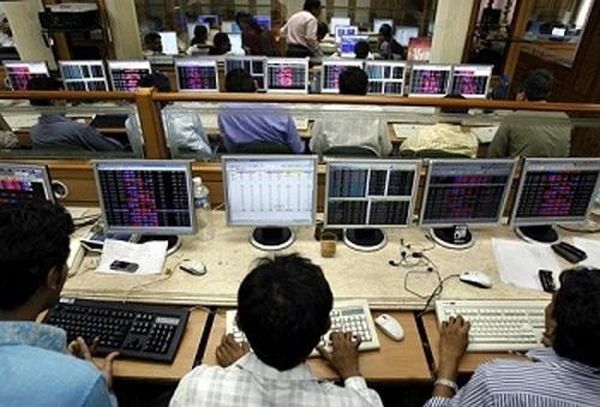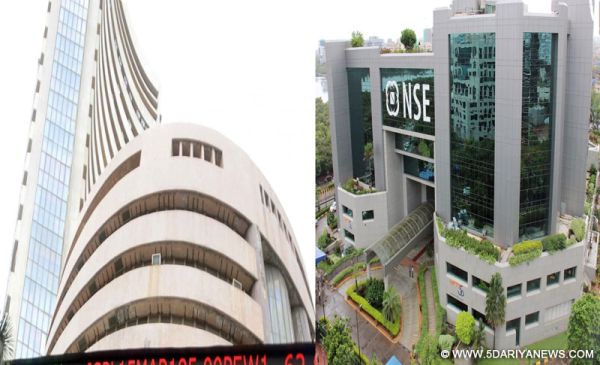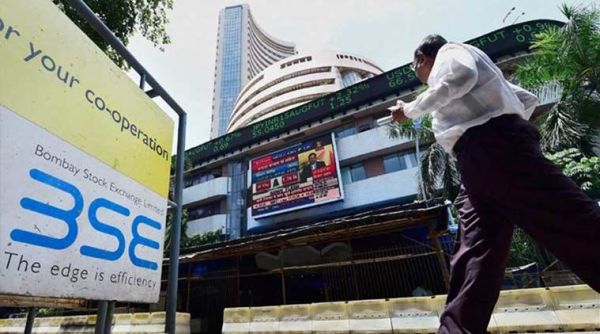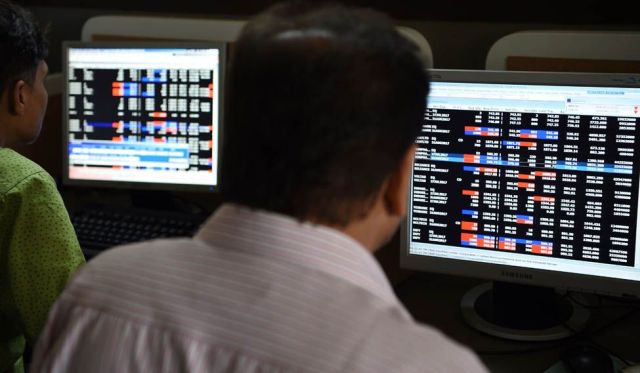
by admin | May 25, 2021 | Interviews

BSE Chief Ashishkumar Chauhan
By Rohit Vaid,
Mumbai : Despite the global equity market volatility, along with banking sector woes, the macro-economic scenario is extremely positive in India, says the top executive of the Bombay Stock Exchange (BSE).
“Banks’ books are getting cleaned up and NPAs (non-performing assets) are also being recognised in a transparent manner. With growing GDP, legislative reforms such as GST and IBC (Insolvency and Bankruptcy Code), India will hit double-digit growth rates soon,” Ashishkumar Chauhan, Chief Executive Office and Managing Director of BSE, told IANS in an interview over the phone.
According to Chauhan, the ongoing strength of the Indian economy and growth was evident in GDP numbers, which were recently released. “India’s economy expanded at its fastest pace since December 2016 as government spending continues to drive economic growth,” he said.
“Under the newly-enacted IBC, the fear of losing control over their companies has prompted defaulting promoters to settle their dues of around Rs 83,000 crore before action was initiated,” he said.
Regarding IPO supply being affected because of low market buoyancy due to high interest and oil costs, Chauhan replied: “Globally, Indian exchanges recorded the highest IPO activity, with 90 IPO launches that raised $3.9 billion in the first half of 2018.”
He said that even at the BSE SME platform, there were 254 listed companies having a market capitalisation of Rs 21,000 crore. “Nearly 46 companies have filed for listing, of which 20 SMEs have received approvals and we hope to hit 300 SMEs listings by the end of the year. So, at BSE, we are very bullish about the IPO markets going ahead,” he added.
On the growth prospects of BSE, Chauhan pointed out that more than the traditional products, BSE was now focusing on growth of next-gen products that cater to “emerging India”.
“Through innovative business models and solutions, we are efficiently scaling up our outreach to the financially excluded population of India,” he said.
“BSE is betting big on facilitating investments in equities, mutual funds and insurance,” he added.
He said BSE now planned to also provide insurance distribution through its nationwide distribution system available in more than 3,000 cities having more than 200,000 people.
Recently, BSE tied up with Ebix Inc. for distribution of insurance in an exchange model, and has applied to the Insurance Regulatory and Development Authority of India for approval.
The stock exchange major has emerged as the largest market for bond distribution, IPOs, Offer to Buy, Offer to Sale and other instruments related to equities.
Last year, BSE raised Rs 1.7 lakh crore on its bond distribution platform and listed total additional debt securities worth Rs 4.3 lakh crore.
“BSE has now truly become a catalyst for capital formation in the country instead of acting solely as a platform for speculative activities,” Chauhan added.
(Rohit Vaid can be contacted at rohit.v@ians.in)
—IANS

by admin | May 25, 2021 | Economy, Markets, News
 By Rohit Vaid,
By Rohit Vaid,
Mumbai : The upcoming quarterly results season, along with macro-economic data points on industrial output and inflation, will determine the trajectory of the key Indian equity indices in the week ahead.
According to market analysts, developments on further imposition of trade protectionist measures between the US and China coupled with volatility in crude oil prices and the rupee’s movement against the US dollar will also affect investor sentiments.
The Q1, 2018-19, earnings result season will kick off from next week. IT major Tata Consultancy Services (TCS) is expected to be the first bluechip firm to come out with its Q1 result on July 10.
Other companies like Infosys, IndusInd Bank, Cyient and Indian Overseas Bank are also expected to announce their Q1 earning results in the coming week.
“The markets next week would look forward to the commencement of the earnings season with large caps like TCS, Infosys and banks like IndusInd and Kotak about to declare their earnings,” Devendra Nevgi, Founder and Principal Partner, Delta Global Partners, told IANS.
“The IT sector earnings will be in focus, given its recent performance, INR weakness and the buoyant US economy.”
Apart from the Q1 results, investors will look forward to the macro-economic data points of IIP (Index of Industrial Production), Consumer Price Index (CPI) and India’s trade figures.
The Central Statistics Office (CSO) is slated to release the macro-economic data points of IIP and CPI on July 12.
“CPI inflation and IIP data will be keenly watched, consensus expects June CPI rise to 5.2 per cent versus 4.87 per cent and May IIP is expected improve to 5.9 per cent versus 4.9 per cent,” Geojit Financial Services’ Research Head Vinod Nair told IANS.
Besides, the movement of Indian rupee against the US dollar and the direction of foreign fund flows will also set the course for the key indices.
On a weekly basis, the Indian rupee closed at 68.88, weaker by 41 paise from its previous close of 68.47 per greenback.
“Over the next week, we expect the India rupee to trade within a range of 68.40-69 levels on spot,” Anindya Banerjee, Deputy Vice President for Currency and Interest Rates with Kotak Securities, told IANS.
“The Indian rupee is being driven by crude oil prices, weakness in Chinese yuan due to the ongoing tariff war between US and China, outflows from domestic equity and debt market and a hawkish US Fed.”
In terms of investments, provisional figures from the stock exchanges showed that foreign institutional investors (FIIs) sold scrips worth Rs 2,455.44 crore during the July 3-6 period.
Figures from the National Securities Depository (NSDL) revealed that foreign portfolio investors (FPIs) divested Rs 2,737.04 crore, or $398.62 million from the equities segment on stock exchanges during the week ended on July 6.
However, on technical charts, the underlying short-term trend of the National Stock Exchange’s (NSE) Nifty50 remains positive.
“Technically, with the Nifty bouncing back from the crucial supports of 10,550 points, the underlying short term trend remains up,” said Deepak Jasani, Head of Retail Research for HDFC Securities.
“Further upsides are likely in the coming week once the immediate resistances of 10,816 points are taken out. A bigger move would open up for the Nifty once it is able to cross the recent intermediate highs of 10,929 points. Crucial supports to watch for any weakness are at 10,604 points.”
Last week, expectation of a healthy rural demand on the back of the government’s enhanced support for the farm sector and an uptrend in manufacturing activity as per macro-data had lifted the key indices.
However, escalation in the trade war tensions between the US and China limited the gains.
Index-wise, the wider NSE Nifty50 closed at 10,772.65 points — up 58.35 points or 0.54 per cent — from its previous close.
Similarly, the barometer 30-scrip Sensex of the BSE made gains. It rose by 234.38 points or 0.66 per cent to close at 35,657.86 points on a weekly basis.
(Rohit Vaid can be contacted at rohit.v@ians.in)
—IANS

by admin | May 25, 2021 | Economy, Markets, News
 By Rituraj Baruah,
By Rituraj Baruah,
Mumbai : Growth in the manufacturing sector and a hike in the minimum support prices of Kharif crops supported investor sentiments and lifted the key equity indices in the week ended Friday.
However, escalation in the trade war tensions between the US and China limited the gains on the domestic indices.
Providing a major support to the market, the Nikkei India Manufacturing Purchasing Managers’ Index (PMI), rose to 53.1 in June from 51.2 in May, registering the fastest improvement since December 2017. The data was released on Monday.
Index-wise, the wider Nifty50 of the National Stock Exchange closed the week’s trade at 10,772.65 points — up 58.35 points or 0.54 per cent — from its previous close.
The barometer 30-scrip Sensex of the BSE rose by 234.38 points or 0.66 per cent to close at 35,657.86 points on a weekly basis.
The market breadth was negative in three out of the five trading sessions of the week, said Deepak Jasani, Head of Retail Research at HDFC Securities.
Prateek Jain, Director, Hem Securities said: “Benchmark indices logged modest gains last week as India’s manufacturing conditions improved in June 2018 at the strongest pace since December 2017 boosted sentiment.”
According to Equity99’s Senior Research Analyst, Rahul Sharma: “Auto and consumer stocks were in demand throughout the week after the Union Cabinet approved a hike in minimum support prices for Kharif crops by 1.5 times of the input cost for the 2018-19 season. This is likely to have a positive effect on the overall economy.”
Jain, however added, gains were capped by the escalating trade war between the US and China.
Further, he said, the Indian rupee weakened during the week to touch a fresh closing low of 68.95 on Thursday, amid fears over a slowdown in the economy which affected the trading sentiments.
On a weekly basis, rupee closed at 68.88, weaker by 41 paise from its previous week’s close of 68.47 per greenback.
In terms of investments, provisional figures from the stock exchanges showed that foreign institutional investors sold scrip worth Rs 2,455.44 crore, while the domestic institutional investors purchased stocks worth Rs 2,073.70 crore during the July 3-6 period.
Figures from the National Securities Depository (NSDL) revealed that foreign portfolio investors (FPIs) divested Rs 2,737.04 crore, or $398.62 million from the equities segment on stock exchanges during the week ended on July 6.
Sector-wise, auto and FMCG were the major gainers and those ending in the negative include metals, infrastructure and realty, Jasani told IANS.
The top weekly Sensex gainers were Bajaj Auto (up 7.55 per cent at Rs 3,023.35); Maruti Suzuki (up 5.48 per cent at Rs 9,304.80); Hero MotoCorp (up 4.74 per cent at Rs 3,636.70); Asian Paints (up 4.64 per cent at Rs 1322.80); and Yes Bank (up 3.77 per cent at Rs 352.40 per share).
The major losers were Vedanta (down 6.89 per cent at Rs 219.50); NTPC (down 5.77 per cent at Rs 150.25); Bharti Airtel (down 5.03 per cent at Rs 361.85); Power Grid (down 2.89 per cent at Rs 181.25); and Tata Steel (down 2.41 per cent at Rs 554.15 per share).
(Rituraj Baruah can be contacted at rituraj.b@ians.in)
—IANS

by admin | May 25, 2021 | Economy, Markets, News
 Mumbai : Expectation of a healthy rural demand on the back of the government’s enhanced farm sector support buoyed the key Indian equity indices on Wednesday.
Mumbai : Expectation of a healthy rural demand on the back of the government’s enhanced farm sector support buoyed the key Indian equity indices on Wednesday.
Additionally, positive economic data on services sector and healthy buying in automobile and banking sector stocks pushed the indices higher, despite broadly negative global cues.
Consequently, the 30-scrip Sensitive Index (Sensex) zoomed by 266.80 points or 0.75 per cent.
Similarly, the wider 50-scrip Nifty of the National Stock Exchange (NSE) ended the day’s trade in the positive territory. It gained 70 points or 0.65 per cent at 10,769.90 points.
The Sensex of the BSE, which opened at 35,385.52 points, ended at 35,645.40 points, higher by 266.80 points or 0.75 per cent from the previous day’s close at 35,378.60 points.
The Sensex touched a high of 35,667.31 points and a low of 35,309.67 during the intra-day trade.
“Markets rallied strongly on Wednesday as it broke out of the recent trading
range. The gains came despite mixed Asian cues,” said Deepak Jasani, Head of Retail Research at HDFC Securities.
“Positive economic data (Nikkei India Services Business Activity Index and Nikkei India Composite PMI Output Index) boosted investor sentiments.”
According to Vinod Nair, Head of Research, Geojit Financial Services said: “After an insipid start, the market gained momentum on account of better auto sales and govt’s announcement of increase in minimum support price (MSP).”
“Rural income and spending power will increase due to higher minimum price and progressing monsoon which may result in higher demand for consumption oriented stocks. Gradual fall in domestic yield and stability in oil price may add provide some direction in the market.”
Globally, major Asian markets closed on a mixed note, while European indices like FTSE
100 and DAX traded in the red.
On the currency front, the rupee ended at 68.74 per dollar, 16 paise weaker than its previous close of 68.58 per greenback.
Investment-wise, provisional data with exchanges showed that foreign institutional investors sold scrip worth Rs 284.58 crore while the domestic institutional investors bought stocks worth Rs 611.01 crore.
Sector-wise, the S&P BSE automobile index gained the most, by 313.70 points, followed by the banking index which ended 201.19 points higher while the healthcare index was up 113.85 points.
On the other hand, the S&P BSE consumer durables index fell by 103.05 points, the IT index was down 85.05 points and the TECK index ended lower by 39.89 points from its previous close.
The major gainers on the Sensex were Bajaj Auto, up 3.95 per cent at Rs 2,978.20; Maruti Suzuki, up 2.69 per cent at Rs 9,220.80; HDFC, up 2.09 per cent at Rs 1,922.85; Hindustan Unilever, up 2.03 per cent at Rs 1,676.15; and Reliance Industries, up 1.90 per cent at Rs 990.05 per share.
The top losers were NTPC, down 1.32 per cent at Rs 153; Vedanta, down 1.21 per cent at Rs 228.15; ONGC, down 1.20 per cent at Rs 155.95; Bharti Airtel, down 1.01 per cent at Rs 366.45; and Tata Motors, down 0.93 per cent at Rs 267 per share.
—IANS

by admin | May 25, 2021 | Economy, Markets, News
 Mumbai : Reviving from early losses, the key Indian equity indices on Tuesday closed in the green, supported by healthy buying in healthcare, auto and oil and gas stocks.
Mumbai : Reviving from early losses, the key Indian equity indices on Tuesday closed in the green, supported by healthy buying in healthcare, auto and oil and gas stocks.
The indices had opened on a flat-to-negative note, tracking mixed Asian markets where caution prevailed due to the ongoing trade war concerns. The European markets, however, traded on a positive note.
According to market analysts, appreciation in the Indian rupee also supported the investor sentiments in the domestic market.
Index-wise, the broader Nifty50 of the National Stock Exchange (NSE) closed at 10,699.90 points — higher by 42.60 points or 0.40 per cent from its previous close of 10,657.30 points.
The barometer 30-scrip Sensex on the Bombay Stock Exchange (BSE), which had opened at 35,344.21 points, closed at 35,378.60 points — up 114.19 points or 0.32 per cent from its previous session’s close of 35,264.41 points.
Sensex touched a high of 35,445.21 points and a low of 35,195.63 points during the intra-day trade. The BSE market breadth was largely even with 1,317 advances against 1,290 declines.
In the broader markets, the S&P BSE mid-cap rose by 0.69 per cent and the S&P BSE small cap ended 0.44 per cent higher from its previous close.
“Nifty witnessed an upside bounce today, amidst a choppy trend,” said Deepak Jasani, Head of Retail Research at HDFC Securities.
Asian markets closed mixed and European markets traded in the green, he said, adding that “the underlying short-term trend is slightly positive”.
According to Dhruv Desai, Tradebulls’ Director and Chief Operating Officer, Sensex and Nifty traded cautious amid trade war tensions between the US and China.
On the currency front, the rupee ended at 68.58 per dollar, 22 paise stronger than its previous close of 68.80 per greenback.
Investment-wise, provisional data with exchanges showed that foreign institutional investors sold scrip worth Rs 1,043.31 crore while the domestic institutional investors bought stocks worth Rs 278.84 crore.
Sector-wise, the S&P BSE healthcare index gained the most, by 251.26 points, followed by the auto index which ended 238.79 points higher while the oil and gas index was up 105.95 points.
On the other hand, the S&P BSE banking index fell by 55.96 points, the metal index was down 34.59 points and the consumer durables index ended lower by 18.58 points from its previous close.
The major gainers on the Sensex were Sun Pharma, up 1.79 per cent at Rs 573.65; Maruti Suzuki, up 1.72 per cent at Rs 8,979.50; Infosys, up 1.44 per cent at Rs 1,353.65; ONGC, up 1.28 per cent at Rs 157.85; and Hero MotoCorp, up 1.17 per cent at Rs 3,453.50 per share.
The top losers were Vedanta, down 3.25 per cent at Rs 230.95; ICICI Bank, down 1.62 per cent at Rs 272.95; HDFC, down 0.56 per cent at Rs 1,883.45; State Bank of India, down 0.52 per cent at Rs 257.75; and Power Grid, down 0.40 per cent at Rs 184.50 per share.
—IANS






